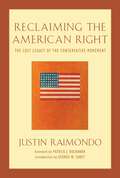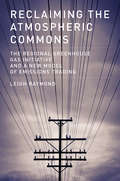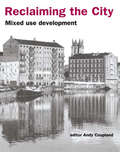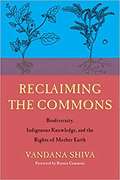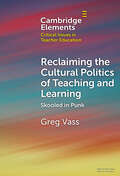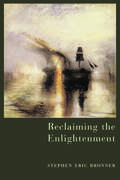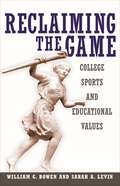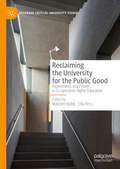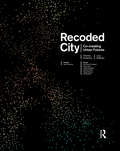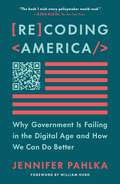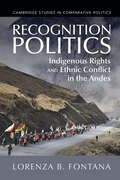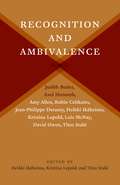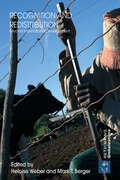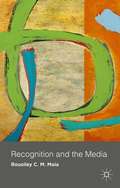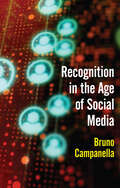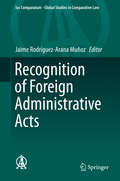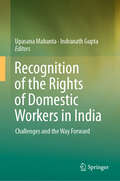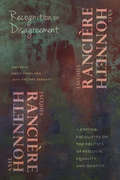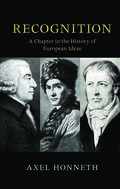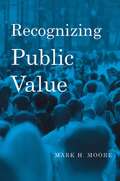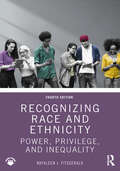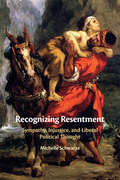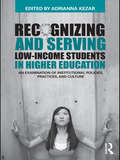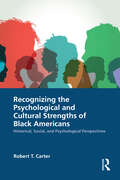- Table View
- List View
Reclaiming the American Right: The Lost Legacy of the Conservative Movement
by Justin RaimondoMany conservatives want to know: Where did the Right go wrong? Justin Raimondo provides the answer in this captivating narrative. Raimondo shows how the noninterventionist Old Right - which included half-forgotten giants and prophets such as Senator Robert A. Taft, Garet Garrett, and Colonel Robert McCormick - was supplanted in influence by a Right that made its peace with bigger government at home and "perpetual war for perpetual peace" abroad. First published in 1993, Reclaiming the American Right is as timely as ever. This new edition includes commentary by Pat Buchanan, political scientist George W. Carey, Chronicles executive editor Scott Richert, and the Ludwig von Mises Institute's David Gordon.
Reclaiming the Atmospheric Commons: The Regional Greenhouse Gas Initiative and a New Model of Emissions Trading (American and Comparative Environmental Policy)
by Leigh RaymondHow the Regional Greenhouse Gas Initiative created a new paradigm in climate policy by requiring polluters to pay for their emissions for the first time.In 2008, a group of states in the northeast United States launched an emissions trading program, the Regional Greenhouse Gas Initiative (RGGI). With RGGI, these states—Connecticut, Delaware, Maine, Maryland, Massachusetts, New Hampshire, New Jersey, New York, Rhode Island, and Vermont—achieved what had been considered politically impossible: they forced polluters to pay the public for their emissions. The states accomplished this by conducting auctions of emissions “allowances”; by 2014, they had raised more than $2.2 billion in revenues. In this first in-depth examination of RGGI, Leigh Raymond describes this revolutionary and influential policy model and explains the practical and theoretical implications for climate policy.Other cap-and-trade schemes had been criticized for providing private profits rather than public benefits, allowing private firms to make money by buying and selling valuable “rights to pollute.” RGGI, by contrast, directed virtually all emissions auction revenues to programs benefiting the public at large. By reframing the issue in terms of public benefits, environmental advocates emphasized the public ownership of the atmospheric commons and private corporations' responsibility to pay for their use of it.Raymond argues that this kind of “normative reframing” is significant not only for environmental policy making but also for theories of the policy process, helping to explain and predict sudden policy change.
Reclaiming the City: Mixed use development
by Andy CouplandMixed use development is about retaining or creating a mix of different uses in cities or neighbourhoods. The trend in UK development has been towards specialisation and areas with single uses. Increasing the mix of uses is thought to reduce the need to travel, lower the likelihood of crime, improve the ambience and attractiveness of areas and contribute to the sustainability of cities.
Reclaiming the Commons: In Defense of Biodiversity, Indigenous Knowledge, and the Rights of Mother Earth
by Vandana Shiva Ronnie CumminsReclaiming the Commons: Biodiversity, Traditional Knowledge, and the Rights of Mother Earth lays out the scientific, legal, political, and cultural struggle to defend the sovereignty of biodiversity and indigenous knowledge. Corporate war on nature and people through patents and corporate Intellectual Property Rights has unleashed an epidemic of biopiracy resulting in important legal battles fighting efforts to patent the rights to many plants, including basmati, neem, and wheat. The author presents details of the specific attempts made by corporations to secure these patents and the legal actions taken to fight them. The book goes beyond the legal struggle to position the necessary solutions to corporate control including the exploring the Rights of Nature and proposing a framework for a Universal Declaration of the Rights of Mother Earth. It is the first detailed legal history of the international and national laws related to biodiversity and Intellectual Property Rights.
Reclaiming the Cultural Politics of Teaching and Learning: Skooled in Punk (Elements in Critical Issues in Teacher Education)
by Greg VassDespite often being associated with anti-establishment, irreverent, and a do-it yourself (DIY) rejection of dominant culture, less considered may the collaborative, communal and curative threads of punk thinking, being and doing. From the outset, punk offered critiques and alternative ways of conceptualizing a world and ways of worlding, that aren't as harmful and constraining as those encountered by many in the dominant milieu of life. This monograph is focused on how and why punk can productively contribute to efforts that are responding to the influences of dominant culture in education, such as the effects of standardization, heightened accountabilities, and 'gap talk'. For this Element, punk can be thought of as social practices that generate cultural resources that can be utilized to critique dominant culture. Hence, this Element aims to make the case that punk sensibilities offer educators opportunities to reclaim the cultural politics of teaching and learning.
Reclaiming the Enlightenment: Toward a Politics of Radical Engagement
by Stephen Eric BronnerSince the mid-twentieth century, intellectuals have attacked the Enlightenment for its imperialism, eurocentrism, and scientism and for the sexism and racism of some of its major representatives. Eager to reclaim the Enlightenment from purely philosophical and cultural interpretations, Bronner shows that the Enlightenment's notion of political engagement keeps democracy fresh and alive by providing a practical foundation for fostering institutional accountability, opposing infringements on individual rights, instilling an enduring commitment to social reform, and building a cosmopolitan sensibility. This forceful and timely reinterpretation of the Enlightenment and its powerful influence on contemporary political life is a resounding wake-up call to critics on both the left and the right.
Reclaiming the Game: College Sports and Educational Values (The William G. Bowen Series #40)
by William G. Bowen Sarah A. LevinIn Reclaiming the Game, William Bowen and Sarah Levin disentangle the admissions and academic experiences of recruited athletes, walk-on athletes, and other students. In a field overwhelmed by reliance on anecdotes, the factual findings are striking--and sobering. Anyone seriously concerned about higher education will find it hard to wish away the evidence that athletic recruitment is problematic even at those schools that do not offer athletic scholarships. Thanks to an expansion of the College and Beyond database that resulted in the highly influential studies The Shape of the River and The Game of Life, the authors are able to analyze in great detail the backgrounds, academic qualifications, and college outcomes of athletes and their classmates at thirty-three academically selective colleges and universities that do not offer athletic scholarships. They show that recruited athletes at these schools are as much as four times more likely to gain admission than are other applicants with similar academic credentials. The data also demonstrate that the typical recruit is substantially more likely to end up in the bottom third of the college class than is either the typical walk-on or the student who does not play college sports. Even more troubling is the dramatic evidence that recruited athletes "underperform:" they do even less well academically than predicted by their test scores and high school grades. Over the last four decades, the athletic-academic divide on elite campuses has widened substantially. This book examines the forces that have been driving this process and presents concrete proposals for reform. At its core, Reclaiming the Game is an argument for re-establishing athletics as a means of fulfilling--instead of undermining--the educational missions of our colleges and universities.
Reclaiming the Road: Mobility Justice beyond Complete Streets
by David L PrytherchImagining equitable streets for all For the past century, our roadways have been engineered as pipes for cars, but they offer vast potential as public spaces. From New York and Boston to Portland and Los Angeles, cities are rethinking their streets, going beyond sidewalks and bike lanes to welcome nonmotorists to share the asphalt roadway. Reclaiming the Road traces the historical evolution of America&’s streets and explores contemporary movements to retake them from cars—temporarily and permanently—for diverse forms of mobility and community life. To share the street raises important questions of equity, in transportation and beyond. David L. Prytherch proposes a bold, intersectional vision of a more just street. Reclaiming the Road connects cutting-edge theory, policy analysis, and firsthand accounts from those leading the charge in transforming our streets to advocate for changing how we think about and design roads. Prytherch features case studies of nine major cities in the United States to show how experiments in reclaiming streets accelerated during the Covid-19 pandemic to become lasting changes. Through in-depth interviews, he shares stories of how planners, transportation advocates, and community leaders have implemented innovative programs for slowing neighborhood streets, opening roads for walking and biking, and reconstructing roadways with public parklets and street plazas as social spaces for curbside conversation. Examining movements to transform streets through the lenses of equity and justice, Reclaiming the Road tackles the conceptual challenge of defining mobility justice and the practicalities of planning a more just public street, offering a compelling vision for the future of America&’s public spaces. Retail e-book files for this title are screen-reader friendly with images accompanied by short alt text and/or extended descriptions.
Reclaiming the University for the Public Good: Experiments and Futures in Co-operative Higher Education (Palgrave Critical University Studies)
by Malcolm Noble Cilla RossThis book asks how we can reclaim the university for the public good. The editors and contributors argue that the sector is in crisis, accelerated by the passing of the UK Higher Education Research Act in 2017 and made visible during the University and College Union strikes in April 2018. In response to this, there are widespread demands to reclaim the university and protect education as a public good, using co-operative structures. Taking an interdisciplinary and social justice perspective, the editors and contributors offer concrete examples of alternative higher education: in doing so, analysing how the future of the university can be recovered. This intersectional volume discusses a broad range of approaches to higher education while disseminating new ideas. It will be of interest and value to those disenchanted with the current state of higher education in the UK and beyond, as well as activists and policy makers.
Recoded City: Co-Creating Urban Futures
by Thomas Ermacora Lucy BullivantRecoded City examines alternative urban design, planning and architecture for the other 90%: namely the practice of participatory placemaking, a burgeoning practice that co-author Thomas Ermacora terms ‘recoding’. In combining bottom-up and top-down means of regenerating and rebalancing neighbourhoods affected by declining welfare or struck by disaster, this growing movement brings greater resilience. Recoded City sheds light on a new epoch in the relationship between cities and civil society by presenting an emerging range of collaborative solutions and distributed governance models. The authors draw on their own fresh research of global pioneers forging localist design strategies, public-realm interventions and new stakeholder dynamics. As the world becomes increasingly digital and virtual, a myriad of online tools and technological options is becoming available. These give unprecedented co-creation opportunities to communities and professionals alike, yielding the benefits of a more open – DIY – society. Because of its close engagement with people, place and local identity, the field of participatory placemaking has huge untapped potential. Responding to the challenges of the Anthropocene era, Recoded City is for decision-makers, developers and practitioners working globally to make better and more liveable cities.
Recoding America: Why Government Is Failing in the Digital Age and How We Can Do Better
by Jennifer PahlkaNamed one of NPR's Best Books of 2023Named one of Ezra Klein's "Books That Explain Where We Are in 2023," The New York TimesLearn more about Jennifer Pahlka's work at recodingamerica.us. “The book I wish every policymaker would read.”—Ezra Klein, The New York TimesA bold call to reexamine how our government operates—and sometimes fails to—from President Obama’s former deputy chief technology officer and the founder of Code for AmericaJust when we most need our government to work—to decarbonize our infrastructure and economy, to help the vulnerable through a pandemic, to defend ourselves against global threats—it is faltering. Government at all levels has limped into the digital age, offering online services that can feel even more cumbersome than the paperwork that preceded them and widening the gap between the policy outcomes we intend and what we get.But it’s not more money or more tech we need. Government is hamstrung by a rigid, industrial-era culture, in which elites dictate policy from on high, disconnected from and too often disdainful of the details of implementation. Lofty goals morph unrecognizably as they cascade through a complex hierarchy. But there is an approach taking hold that keeps pace with today’s world and reclaims government for the people it is supposed to serve. Jennifer Pahlka shows why we must stop trying to move the government we have today onto new technology and instead consider what it would mean to truly recode American government.
Recognition Politics: Indigenous Rights and Ethnic Conflict in the Andes (Cambridge Studies in Comparative Politics)
by Lorenza B. FontanaThis pioneering work explores a new wave of widely overlooked conflicts that have emerged across the Andean region, coinciding with the implementation of internationally acclaimed indigenous rights. Why are groups that have peacefully cohabited for decades suddenly engaging in hostile and, at times, violent behaviours? What is the link between these conflicts and changes in collective self-identification, claim-making, and rent-seeking dynamics? And how, in turn, are these changes driven by broader institutional, legal and policy reforms? By shifting the focus to the 'post-recognition,' this unique study sets the agenda for a new generation of research on the practical consequences of the employment of ethnic-based rights. To develop the core argument on the links between recognition reforms and 'recognition conflicts', Lorenza Fontana draws on extensive empirical material and case studies from three Andean countries – Bolivia, Colombia and Peru – which have been global forerunners in the implementation of recognition politics.
Recognition and Ambivalence (New Directions in Critical Theory #77)
by David Owen Judith Butler Amy Allen Axel Honneth Robin Celikates Jean-Philippe Deranty Lois McNayRecognition is one of the most debated concepts in contemporary social and political thought. Its proponents, such as Axel Honneth, hold that to be recognized by others is a basic human need that is central to forming an identity, and the denial of recognition deprives individuals and communities of something essential for their flourishing. Yet critics including Judith Butler have questioned whether recognition is implicated in structures of domination, arguing that the desire to be recognized can motivative individuals to accept their assigned place in the social order by conforming to oppressive norms or obeying repressive institutions. Is there a way to break this impasse?Recognition and Ambivalence brings together leading scholars in social and political philosophy to develop new perspectives on recognition and its role in social life. It begins with a debate between Honneth and Butler, the first sustained engagement between these two major thinkers on this subject. Contributions from both proponents and critics of theories of recognition further reflect upon and clarify the problems and challenges involved in theorizing the concept and its normative desirability. Together, they explore different routes toward a critical theory of recognition, departing from wholly positive or negative views to ask whether it is an essentially ambivalent phenomenon. Featuring original, systematic work in the philosophy of recognition, this book also provides a useful orientation to the key debates on this important topic.
Recognition and Redistribution: Beyond International Development (ISSN)
by Heloise Weber and Mark T. BergerThis is an innovative and insightful approach to the global politics of development. The authors challenge conventional perspectives of, and approaches to, development and offer alternative accounts of the politics of development from the perspective of non-state centred and non-state centric approaches. The authors offer critical reinterpretations of historical experiences of development processes and together with insightful analysis of contemporary development strategies this is a genuinely new perspective on the global politics of development. Moreover, in moving beyond more ‘economistic’ approaches to development this book seeks to uncover the complexity of development in ways that account for social relations of power and identity. The authors successfully demonstrate the transdisciplinary nature of the politics of development in their respective engagement with political theory, anthropological and sociological perspectives in ways that provide an overall integrated approach to the politics of recognition and redistribution in development. In contrast to globalisation calling into question the idea and practices of international development, this study situates the question of the politics of the ‘international’ within a broader historical context of global social relations of power and dispossession, and their impact on states, regions and cultures. In framing the project as whole through the concepts of recognition and redistribution, this is a genuine effort to ‘rethink development’. It is timely in an era of global politics and globalisation wherein both issues of identity and struggles over development challenge us to re-rethink disciplinary boundaries.
Recognition and the Media
by Rousiley C.M. MaiaThis collection examines Axel Honneth's theory of recognition and the crucial role played by the media in struggles for recognition. It brings together debates on controversial aspects of Honneth's work and a set of intriguing empirical studies including with slum-dwelling adolescents, leprosy patients and women exposed to child labor exploitation
Recognition in the Age of Social Media: Race, Gender, And Violence
by Bruno CampanellaThe desire to be recognized is a basic human trait. In contemporary society, social media platforms play a key role in defining how processes of recognition take shape. To post, to like, or to comment have become daily practices of expressing individual recognition. On the one hand, social media platforms make it easier for individuals to be visible and to be recognized; on the other hand, they control the structure of these dynamics. This timely and original book reflects on processes of recognition on social media platforms. Revisiting traditional discussions on recognition theory, Bruno Campanella investigates how the field of media and communication has used the concept and poses new questions raised by the omnipresence of social media. He argues that existing work does not fully explore the impact of platforms on contemporary processes of recognition. Individuals must learn new skills to make themselves visible online, but how to achieve this changes as a consequence of the role played by platforms: what is seen depends on decisions taken by their algorithms, which impacts how individuals and social groups are valued in society. Recognition in the Age of Social Media is a key contribution to the field, and a must-read for students and scholars of media and communication, sociology, and politics.
Recognition of Foreign Administrative Acts
by Jaime Rodríguez-Arana MuñozThis book presents an analysis of the concept of the administrative act and its classification as 'foreign', and studies the administrative procedure for adopting administrative acts in a range of countries in and outside Europe. While focusing on the recognition and execution of foreign administrative acts, the book examines the validity, efficacy and enforceability of foreign administrative acts at national level. The book starts with a general analysis of the issue, offering general conclusions about the experiences in different countries. It then analyses the aforementioned themes from the perspective of the domestic law of different European nations and a number of international organisations (European Union, MERCOSUR, and Andean Community). In addition, the book studies the role of the European Union in the progress towards the recognition and execution of foreign administrative acts, where the principle of mutual recognition plays a vital part. Finally, the book analyses the international conventions on the recognition and execution of administrative acts and on the legalisation of public documents.
Recognition of the Rights of Domestic Workers in India: Challenges and the Way Forward
by Indranath Gupta Upasana MahantaThis book brings together a set of contributions that examine the complexities associated with domestic work by highlighting not only the legal issues but also exploring the social, psycho-social, economic, and cultural dimensions of domestic work. The book aims to ignite a collective effort towards ensuring decent work for domestic workers and facilitate a public debate on their rights. It includes discussions on the issue of social justice with special emphasis on invisibilization and undervaluation of domestic work, feminization of domestic work, and recognizes the rights of domestic workers as human rights. The issues covered in this book bridge the gap between legal and social dimensions of domestic work and address the discrimination faced by domestic workers in a holistic manner. Given its scope, the book would appeal to both academics (law as well as social science) and non-academics. It will be a useful tool for teachers, students, practitioners, policy-makers and civil society organizations working for the unorganized sector.
Recognition or Disagreement: A Critical Encounter on the Politics of Freedom, Equality, and Identity (New Directions in Critical Theory #30)
by Axel Honneth Jacques RancièreAxel Honneth is best known for his critique of modern society centered on a concept of recognition. Jacques Rancière has advanced an influential theory of modern politics based on disagreement. Underpinning their thought is a concern for the logics of exclusion and domination that structure contemporary societies. In a rare dialogue, these two philosophers explore the affinities and tensions between their perspectives to provoke new ideas for social and political change.Honneth sees modern society as a field in which the logic of recognition provides individuals with increasing possibilities for freedom and is a constant catalyst for transformation. Rancière sees the social as a policing order and the political as a force that must radically assert equality. Honneth claims Rancière's conception of the political lies outside of actual historical societies and involves a problematic desire for egalitarianism. Rancière argues that Honneth's theory of recognition relies on an overly substantial conception of identity and subjectivity. While impassioned, their exchange seeks to advance critical theory's political project by reconciling the rift between German and French post-Marxist traditions and proposing new frameworks for justice.
Recognition: A Chapter in the History of European Ideas (The Seeley Lectures)
by Axel HonnethThe idea that we are mutually dependent on the recognition of our peers is at least as old as modernity. Across Europe, this idea has been understood in different ways from the very beginning, according to each country's different cultural and political conditions. This stimulating study explores the complex history and multiple associations of the idea of 'Recognition' in Britain, France and Germany. Demonstrating the role of 'recognition' in the production of important political ideas, Axel Honneth explores how our dependence on the recognition of others is sometimes viewed as the source of all modern, egalitarian morality, sometimes as a means for fostering socially beneficial behavior, and sometimes as a threat to 'true' individuality. By exploring this fundamental concept in our modern political and social self-understanding, Honneth thus offers an alternative view of the philosophical discourse of modernity.
Recognizing Public Value
by Mark H. MooreMoore’s classic Creating Public Value offered advice to managers about how to create public value, but left unresolved the question how one could recognize when public value had been created. Here, he closes the gap by helping public managers name, observe, and count the value they produce and sustain or increase public value into the future.
Recognizing Race and Ethnicity: Power, Privilege, and Inequality
by Kathleen J. FitzgeraldThis best-selling textbook explains the current state of research in the sociology of race/ ethnicity, emphasizing white privilege, the social construction of race, and the newest theoretical perspectives for understanding race and ethnicity. It is designed to engage students with an emphasis on topics that are meaningful to their lives, including sports, popular culture, interracial relationships, and biracial/multiracial identities and families.The fourth edition comes at a pivotal time in the politics of race and identity. Fitzgerald includes vital new discussions on race and technology, attacks on critical race theory and the teaching of race, racism, and privilege in schools, and ongoing police violence against people of color. Prominent attention is given to immigration and the discourse surrounding it, policing and minority populations, and the criminal justice system. Using the latest available data, the author examines the present and future of generational change. New case studies include athletes and racial justice activism, removal of Confederate monuments, updates on Black Lives Matter, and Native American activism at Standing Rock.
Recognizing Resentment: Sympathy, Injustice, And Liberal Political Thought
by Michelle SchwarzeWe typically think of resentment as an unjustifiable and volatile emotion, responsible for fostering the worst political divisions. Recognizing Resentment argues instead that sympathy with the resentment of victims of injustice is vital for upholding justice in liberal societies, as it entails recognition of the equal moral and political status of those with whom we sympathize. Sympathizing with the resentment of others makes us alive to injustice in a way no rational recognition of wrongs alone can, and it motivates us to demand justice on others' behalves. This book rehabilitates arguments for the moral and political worth of resentment developed by three influential thinkers in the early liberal tradition - Joseph Butler, David Hume, and Adam Smith - and uses these to advance a theory of spectatorial resentment, discussing why we should be indignant about the injustice others face, and how such a shared sentiment can actually bring liberal citizens closer together.
Recognizing and Serving Low-Income Students in Higher Education: An Examination of Institutional Policies, Practices, and Culture
by Adrianna KezarWritten for administrators, faculty, and staff in Higher Education who are working with low income and first-generation college students, Recognizing and Serving Low-Income Students in Higher Education uncovers organizational biases that prevent post-secondary institutions from adequately serving these students. This volume offers practical guidance for adopting new or revised policies and practices that have the potential to help these students thrive. This contributed volume is based on empirical studies that specifically examine the policies and practices of postsecondary institutions in the United States, England, and Canada. The contributing authors argue that discussions of diversity will be enriched by a better understanding of how institutional policies and practices affect low-income students. Unlike most studies on this topic, this volume focuses on institutional rather than federal, state and public policy. Institutional policies and practices have been largely ignored and this volume lifts the veil on processes that have remained hidden.
Recognizing the Psychological and Cultural Strengths of Black Americans: Historical, Social and Psychological Perspectives
by Robert T. CarterThis book examines the cultural beliefs and practices of Black folks in relation to psychological strength.Divided into four parts, the book begins with a discussion on the history of African civilizations, including an analysis of faiths, architecture, and cultural diversity of the continent, followed by a meaningful dialogue on the history of slavery and plantations in North America. The later sections are a study on the contribution of the African American community towards America’s prosperity. The book explores cultural values as a source of power, and uses historical, social, and psychological research to construct a framework of Black cultural values and psychological resolve. The author offers practical applications and interventions to demonstrate how this framework can be applied to training and policy matters on both individual and systemic levels.Recognizing the Psychological and Cultural Strengths of Black Americans is essential reading for students and academics in the fields of Psychology, Sociology, Critical Race Theory, Political Science, and other related disciplines. It will also be a useful resource for professionals including policy makers, psychologist, counsellors, educators, and social workers.
